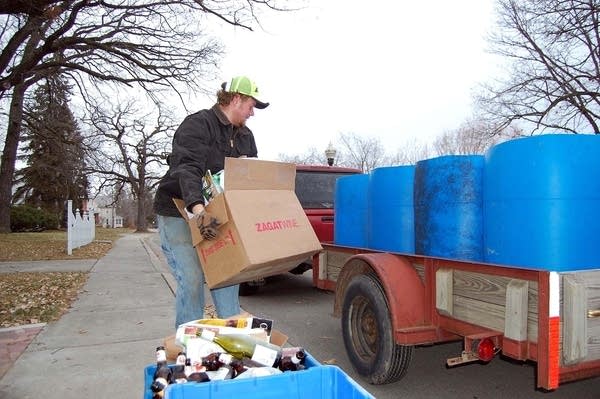A guy and a truck provide recycling pickup in Bemidji
Go Deeper.
Create an account or log in to save stories.
Like this?
Thanks for liking this story! We have added it to a list of your favorite stories.

The City of Bemidji used to provide a curbside recycling service. But the 10-year-old program got the axe in 2007 because of budget cuts.
Now, if you want the convenience of curbside recycling in Bemidji, there's only one place to go. It's a fledgling, one-man company run by a 21-year-old Bemidji State University student named Trevor Plendl.
"Just me and my little pickup truck, and a tiny little trailer that I run around town with," Plendl said.
Plendl started his business last spring after hearing complaints about the lack of curbside service in town. He started with just a few customers, mostly BSU professors and fellow students. He now provides curbside pickup for 60 households, charging $5 a month for the service.
Turn Up Your Support
MPR News helps you turn down the noise and build shared understanding. Turn up your support for this public resource and keep trusted journalism accessible to all.
The business isn't profitable, but Plendl doesn't care. He says people need convenient recycling options.
"I think it's absurd that we don't have some kind of conduit where people can be more environmentally sound," Plendl said. "Obviously, the choice is up to the consumer whether they want to recycle, but it should be up to the city to provide the means to do so."
Bemidji residents who want to haul their own recyclables can bring them to a county run drop-off center.

State law requires cities in the Twin Cities metropolitan area with a population of 5,000 or more to provide curbside recycling.
In greater Minnesota, cities with 20,000 or more people must offer the service. But for Bemidji -- with a population of less than 13,000 -- it's an optional service that's also expensive, City Manager John Chattin said.
"Would we like to have curbside recycling? Of course we would," Chattin said. "We simply can't afford it without a subsidy."
The curbside program cost the city about $80,000 a year. But a series of sharp cuts in local government aid from the state forced city leaders to make budget cuts anywhere they could find them, Chattin said.
"That was one of the things that we could eliminate, and eliminate those expenses. So that was one of the first things to go," he said.
Budget pressures are forcing changes in other communities, too. A report from the Minnesota Pollution Control Agency shows some counties are dealing with cuts by closing down recycling centers or limiting the types of materials they collect. The report says rural recycling programs are hardest hit, because it's more expensive to haul materials to distant markets.
For Paul Smith, supervisor of the MPCA's local government assistance program, it's disappointing to see recycling programs take a step backward.
"We are concerned, because these programs do have to be subsidized," Smith said. "They are matched quite a bit with local dollars, and... we're dealing with state and local budgets that are under a lot of stress right now."
The financial stress for local governments could get worse. As a result of this week's dismal budget forecast, Gov. Tim Pawlenty said he may withhold the next round of state aid payments which are due in December.
The global recession poses other challenges. Recycling operations offset their costs by selling recycled material. But last year, markets for plastics, glass, paper and metals plummeted. The markets aren't expected to improve until construction and manufacturing pick up.
Some counties are concerned about a longer term problem. The state's recycling system was built in the early 1990s. But some of the equipment has deteriorated and needs upgrades.
Bill Patnode, environmental services director in Beltrami County, said a state funding system for recycling, developed in 1989 by the Governor's Select Committee on Recycling and the Environment, needs more money, not less. Without more dollars from the system or more solid waste management dollars, more counties will fold programs, he said.
"We've got some really, really fragile programs out there right now," Patnode said. "The counties that are getting just the minimum -- if that minimum disappears, those programs are gone. So it's a very, very fragile playing field."
Despite the challenges, there are proposals to raise the bar on the level of recycling in Minnesota. Right now, the state recycles about 44 percent of its total waste. A state climate change advisory group wants to see that level reach 60 percent by 2025.



